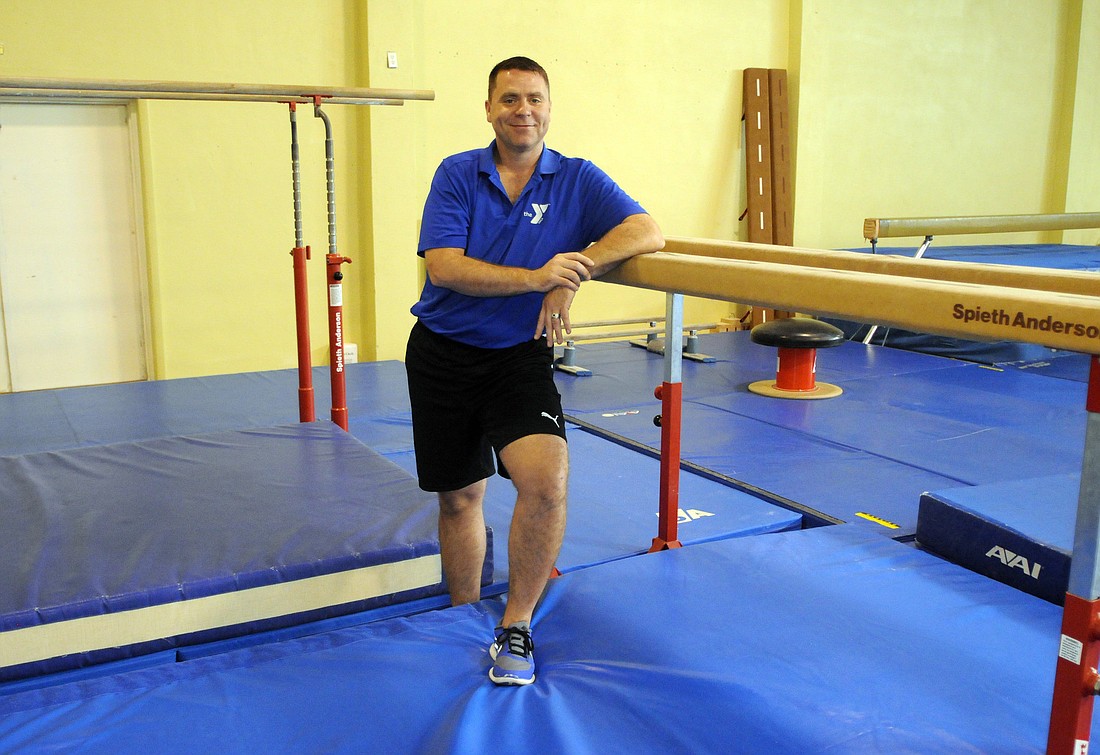- November 19, 2025
-
-
Loading

SARASOTA — Jason Collins always knew he could fly.
But, the then 9-year-old just hadn’t quite mastered his newfound set of wings.
That didn’t stop the former soccer goalkeeper from testing his limits every chance he got.
Collins would sit in the box and wait for the ball to cross the other side of the field.
As soon as that happened it was game on.
Collins would pull himself up onto the top bar of the goal and backflip off. He would repeat the process again and again with the same result until the ball made it’s way back down the field.
“I always landed on my face,” Collins says with a laugh.
After her son attempted one too many backflips, Collins’ mother enrolled him in gymnastics much to his delight.
“I always wanted to be in it,” Collins says.
Now, 30 years later, Collins is teaching backflips to Sarasota’s new wave of young gymnasts — albeit in a safer setting.
Last week, Collins celebrated his one-year anniversary coaching the Sarasota Surge YMCA gymnastics team. Collins returned to the gym after 15 years as a professional opera singer. In December, Collins was named the Surge’s new program director.
Since then, Collins has hired a pair of former Olympians and also started a boys program.
Most recently, Collins took 39 gymnasts to the 2013 YMCA National Gymnastics Championships. Of those 39 gymnasts, 38 placed in the top 10, with 11 gymnasts capturing individual all-around titles.
“It was an embarrassment of riches,” Collins says. “Seeing them do well or learn a new skill is as good as, if not better than, any standing ovation I’ve received.”
A native of South Carolina, Collins began taking gymnastics when he was 9 years old; within six months he was training at a competitive level — traveling 90 minutes away three times a week to compete.
“It was fun,” says Collins, who thrived on the high bar and floor exercise. “It was an adrenaline rush. Although I didn’t know what an adrenaline rush was at that age.”
Collins competed until he was 15 years old. At that point, he felt he had achieved all gymnastics had to offer and was ready to take the next step in his career.
His coach at the time gave him a job as an instructor, and Collins quickly discovered he had a passion for helping other gymnasts achieve their goals.
“I had really influential coaches who taught me good technique, how to stay safe and have fun,” Collins says. “They were just good people who I looked up to, and I wanted to be like them.”
Collins coached through his sophomore year at the University of South Carolina before his career took a somewhat unexpected turn.
A former voice major and Gamecocks cheerleader, Collins received a call that the university was in need of a singer. Collins obliged and shortly thereafter he was approached about auditioning for The Juilliard School.
After submitting a tape and participating in a weeklong series of auditions, Collins received a four-year scholarship. After graduating from Juilliard with bachelor’s degree in music, Collins was one of two people accepted to the prestigious Curtis Institute of Music, in Philadelphia, where he received his master’s degree in opera.
Upon graduation, Collins traveled throughout the world performing at the Kennedy Center, the San Francisco Opera, the Seattle Opera and throughout Italy, among other locations.
But, after nine months out of the year on the road, Collins decided to take a break from the stage and return to his first passion.
Now, Collins, who still flips about the gym on occasion, is focused on building the Surge program and bringing national recognition to it.
Collins’ competitive gymnasts train a minimum of 16 hours a week, but there are some who will spend 25 to 30 hours a week in the gym.
“We’re building champions inside and out,” Collins says. “The serious ones — I’m not going to deny them training. I’ll sacrifice a little sleep.”
“If you want to be an elite, you basically have to do it like a fulltime job,” Collins says. “It’s difficult but very doable. I’m just happy to be a part of it.”